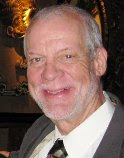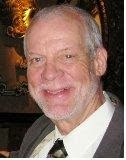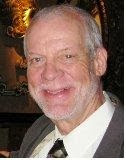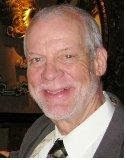Preamble
What are men afraid of? Is it a part of being “macho”? It seems to me that it is not related to sexual orientation. I see it even in this Storytellers group—men are reluctant to share their vulnerability, their pain. Perhaps it is because we are all Baby-Boomers or older. Perhaps it was growing up in the decades of seemingly endless wars, whether hot or cold. It could have been our heroes on TV and movie screens—Charlton Heston, Humphrey Bogart, Marlon Brando, Clint Eastwood, John Wayne. Perhaps it was ubiquitous homophobia, insinuating into our lives the scandalousness of showing tenderness or warm affection toward any man. Whatever the source, it is a theme that has run throughout my associations with men from my earliest days. And that has left a hole in my soul that remains unfilled to this day.
In recalling the men in my life and writing about them, wounds have been opened that never healed but were only glazed over by time and circumstance. They are the neglected infrastructure of my life and I have run into a deep pothole. Perhaps in writing this, I can throw some “cold patch” into it and smooth out some of the pain.
Homer
Homer E. Wright was my maternal grandfather, the only grandparent I ever knew. My mother was the oldest of six children growing up on the outskirts of Pratt, Kansas, in the nineteen-teens and –twenties. A couple of cows and a few chickens shared the yard. Granddad worked his entire life for the Rock Island RR. His wife, Alma, died in 1943 of colon cancer. He continued living in Pratt until he retired in 1952. It was then that he moved to Hutchinson to live with my parents and six-year-old “Lewis the Third” in a newer, larger house on which he made the down payment on the $12,500 mortgage. The house had three small bedrooms, one bath, a single-car attached garage, a large yard, and no basement. Because Dad used one of the bedrooms as an office, Granddad and I shared a bedroom. He got the bed and I slept on a wire-frame divan with removable cushions. (I can remember that I liked to sleep on my stomach and let one leg drop down into the cradle formed by the tucked in sheets.)
Granddad was very generous with his money. He bought us our first TV that same year—even before there was a broadcast station within range. He also paid for my first bicycle and only pet dog.
In 1955, we all piled into Granddad’s ‘52 Packard and headed for Washington, D.C., New York City, Boston, and Newport, Connecticut, to see the sights and visit aunts and uncles on my mother’s side. While climbing the Statue of Liberty, I left Granddad’s Kodak box camera on a bench at a rest stop halfway up the long, long staircase. It was gone by the time we came back down. I feared his wrath but, as with other emotions, it was missing in action.
When he died in November of 1955, he left each of his six children $15,000. My parents used the money to pay off the mortgage. We burned it in the fireplace.
As generous as Granddad was with his money, he was every bit as parsimonious with his personal attention. I have no memory of having a conversation with him or any physical touching. Even when he gave me a gift, it was not because he handed it to me. It just “appeared”. With a tip of the bowler to Winston Churchill, he was “a riddle, wrapped in a mystery, inside an enigma”.
Perhaps it is not a coincidence that his offspring scattered to the four winds, Harold to a farm in the far southeast corner of Kansas; Carl to Alaska and Mossy Rock, WA; Merle to Stone Mountain, GA; Ruth to New London, CT; and Verna to somewhere in Texas. Perhaps it wasn’t Granddad. Maybe it was only escaping Kansas that was important.
Dad
Dad was the oldest of four boys born on a farm near Cheney, Kansas. I never knew either of his parents but he told the story of their losing their farm during the Depression. It was the only time he ever saw either of them cry. It moved him so deeply that he resolved to spend his working life helping farmers get the loans they needed to prosper.
My dad was much more approachable than Granddad. Before I was old enough for kindergarten, on Sunday mornings I would sit on his lap while he read the comics to me. I would ask him to “point” so I could follow along. It gave me a great “leg up” on learning to read myself.
His relationship with my mother was almost like a business partnership. If it weren’t for the Sunday evening every month that their bridge club met, there would have been hardly any socializing at all. My ex-wife remembers my mother criticizing my dad’s driving while vacationing. (My dad drove as part of his business. He put 30,000 miles per year on his company car without ever causing an accident.) They slept in twin beds–like Lucille Ball and Desi Arnaz but without the bickering—and even dressed in separate rooms. Dad was a “soft touch”. Everybody liked him. I think Mom resented him for being that way but her latent lesbianism meant she couldn’t stand intimacy, either.
Dad had no idea how to parent. Mother handled all the disciplining, including spanking. He didn’t know how to be truly tender, either. When he found the dog Homer had given me dead in the street—I’m not sure it wasn’t his car that did it—he was annoyed at having to find a spot in the backyard to bury him. The only “heart-to-heart” talk I can ever remember having with him was when I was entering middle school and he felt obligated to tell me what a jock strap was for. I think he was more uncomfortable that I was.
Still, I felt I understood Dad more than I ever did Mom. I think I adopted many of his ways, especially the way he took care of business in his office at home, sort of like being there but not being there. That was true of me much of the time while my kids were growing up. It is the biggest regret of my life.
Laurin
There’s a neat kind of symmetry to having been in love with one woman and one man. It would have been even more remarkable were I able to say that I was single for the first 26 years of my life (true), married to a woman for the second 26 years (also true) and then married to a man for the final 26-year installment of my life. I only got to live with Laurin for half that long. Had he not been twenty years older than I, we might have made it to that milestone.
Laurin and I filed for divorce from our wives when it became apparent that we had something truly special going on between us. He had been married for nearly fifty years and he and his wife had five children, all grown. Laurin had the “hots” for me from the moment we first met. He was not shy about expressing it. The way he looked me in the eyes without saying a word embarrassed me in the extreme. His directness was something I had never encountered before in a man.
I was at that time in the process of getting in touch with my innate sexuality. I was seeing a gay therapist in Ann Arbor. He was urging me to go slow. The fact that Laurin lived 55 miles away in Flint, where he taught high school social studies, gave me the space I needed to sort things out. It took a lot of sorting—seven years in fact. We stayed in touch through letters—the snail-mail kind. By 1998, I was openly investigating the gay culture.
That May, I attended a weekend financial seminar for gay men and women over 50. The keynote speaker was Quentin Crisp, author of The Naked Civil Servant. Laurin was there also. We picked up where we had left off. Laurin’s wife had been living for many years in Hylton Head, South Carolina, where they owned a condominium. Although we still lived 55 miles apart, we met on a few occasions for dinner or to attend the monthly meetings of Body Electric in Detroit.
I wrote Laurin a letter to inform him that I thought I was ready to take our friendship to a deeper level. I had been reading books by men who were gay but living a closeted existence within a heterosexual marriage. In the car one day that May, I told my wife, Janet, about a case I had read about involving a Mormon couple who took annual vacations to New York City with their children. She would spend the week taking the children to museums, concerts, and the theater while Dad would check out the gay bars. At the end of the week, they would resume their “normal” existence back in Utah.
Janet’s response was to ask me, “Is that what you want?” I said, “No”. She asked what it was I did want. I told her that I wanted to spend the rest of my life with a man. That night, I slept in our son’s former bedroom and we began the process of getting a divorce.
Three weeks later, I participated in a workshop for gay men seeking deeper same-sex relationships. I waited for a response to my letter from Laurin. Nothing came. A couple of months went by; still no response. Finally, one of us called the other. I don’t remember who was which. I asked Laurin about the letter. He said, “What letter?” Turns out, I had typed the letter but never mailed it. Freud lives!
The die had been cast, nevertheless, and the two of us began to plan a vacation tryst in a place with sand, palm trees, and privacy. But first, we needed a trial run. We arranged to rendezvous at the very cabin in Lakelands Trail State Park, MI, where we first met. I was there to greet Laurin as he drove up. He got out of his second-hand Cadillac and immediately removed his toupee and flung it across the trunk. For both of us, the moment marked the end of pretending to be who we were not.
Laurin was unlike any man I had ever met. He delighted in his body and in mine. He was spontaneous, direct, and completely devoted to my happiness. His favorite movie was The Unsinkable Molly Brown (he was a Colorado native). Early in the movie there is a scene where Harve Presnell and Debby Reynolds are laying in the grass under a tree. He sings to his love, Molly, “I’ll Never Say ‘No’”. Laurin vowed that he would never say “No” to me—and he kept that promise for the fourteen years we were together. (This is not to say that he never did things I would not have approved, if given a chance.)
That’s what made Laurin so precious to me. He went wherever I went and vice versa. We couldn’t get enough of each other. I had finally found a man who truly enjoyed my company, who wanted nothing more than to wake up next to me in the morning. For the first time in my life, I felt that I truly mattered to another man. It was like heaven.
© 28 March 2016
About the Author
I came to the beautiful state of Colorado out of my native Kansas by way of Michigan, the state where I married and I came to the beautiful state of Colorado out of my native Kansas by way of Michigan, the state where I married and had two children while working as an engineer for the Ford Motor Company. I was married to a wonderful woman for 26 happy years and suddenly realized that life was passing me by. I figured that I should make a change, as our offspring were basically on their own and I wasn’t getting any younger. Luckily, a very attractive and personable man just happened to be crossing my path at that time, so the change-over was both fortuitous and smooth. Soon after, I retired and we moved to Denver, my husband’s home town. He passed away after 13 blissful years together in October of 2012. I am left to find a new path to fulfillment. One possibility is through writing. Thank goodness, the SAGE Creative Writing Group was there to light the way.









